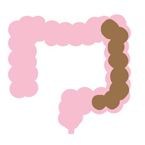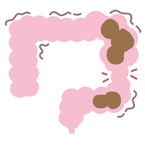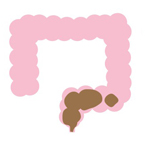
Constipation
General SurgeryGastroenterology Hepatology
Constipation is a common ailment among urban dwellers. Besides being influenced by dietary habits, lifestyle, and physiological factors, other disease-related factors can lead to constipation. Once constipation becomes a severe issue, it may give rise to anal problems, bowel obstruction, and an increased risk of colorectal cancer, making it a matter not to be taken lightly.
Symptoms
The severity and presentation of constipation symptoms vary among individuals, and constipation may be a symptom of other potential health issues. Common symptoms include:
- Difficulty in bowel movements: Feeling the need to strain during bowel movements, with a noticeable decrease in the urge to defecate.
- Reduced bowel frequency: Typically indicating a decrease in the number of bowel movements per week, sometimes as infrequent as one to two times per week.
- Changes in stool consistency: Stools become dry, complex, and sometimes require manual extraction.
- Abdominal bloating and discomfort: Accompanied by feelings of abdominal bloating, discomfort, or abdominal pain.
- Sensation of incomplete evacuation: Even after a bowel movement, feeling that the evacuation is not complete.
- Discomfort in the digestive system: May be accompanied by other digestive system symptoms such as abdominal pain, bloating, vomiting, etc.
- Delay in bowel movements: Patients may spend longer on bowel movements.
- Anal pain during bowel movements: Constipation may sometimes be accompanied by discomfort or pain in the rectal and anal area.
- Feeling abdominal pressure: Constipated individuals may sometimes feel a certain level of pressure in the abdominal region.
If persistent or recurrent constipation symptoms occur, it could be a sign of other potential gastrointestinal health issues, and consulting a doctor for evaluation and diagnosis is advisable.

Doctors diagnose patients with constipation through the following methods:
- Medical History Inquiry: Doctors inquire about the patient's dietary habits, lifestyle, and bowel habits.
- Physical Examination: Doctors can understand potential gastrointestinal issues through a physical examination.
- Blood Tests: Used to rule out other diseases that may cause constipation.
- Colonoscopy: Further examines the structure of the colon to rule out organic problems.
Constipation can be classified into different types, including:
Relaxation-type Constipation
It is mainly caused by slow intestinal movement or lack of peristalsis. It may be related to pregnancy, hormonal changes, certain medications, neurological issues, or a low-fibre diet.
Spastic-type Constipation
It is caused by excessive tension or spasms in the intestinal muscles. It may be associated with stress, anxiety, improper diet, or abnormalities in the gastrointestinal nervous system.
Rectal-type Constipation
It is related to issues in the rectum or anus. It could be due to the inability of the rectal muscles to coordinate bowel movements, leading to difficulty in defecation. Rectal-type constipation may be associated with conditions like anal fissures, haemorrhoids, or other rectal diseases.
Causes of Constipation
|
Risk Factors
|
Long-term and severe constipation may be linked to some serious diseases and complications. Here are some possible effects:
Treatment
Treatment methods for constipation typically involve the following aspects:
General Treatment Methods
| Dietary Adjustments | A high-fibre diet can promote bowel movements and increase the frequency of bowel movements. Increasing water intake also helps maintain bowel lubrication. |
| Lifestyle Changes | Increasing physical activity; moderate exercise helps promote bowel movements and improve constipation symptoms. |
| Establishing Regular Bowel Habits | Establishing a fixed time for bowel movements and avoiding the suppression of the urge to defecate. |
| Medication Treatment | Includes lubricants, fibre supplements, and bowel stimulants. These medications help increase bowel lubrication and promote bowel movements. |
For severe constipation, doctors may consider the following treatment methods
| Bowel Activators | These medications stimulate bowel movements, promoting defecation. |
| Pelvic Floor Physical Therapy | For constipation related to pelvic floor muscle dysfunction, physical therapy may help improve muscle coordination. |
| Biofeedback Therapy | By measuring physiological indicators such as muscle activity, biofeedback therapy assists patients in learning and changing physiological responses. |
Surgical Treatment:
For most cases of constipation, surgery is generally not the first-line treatment. However, in extreme situations, doctors may consider the following surgical options:
| Colon Resection Surgery | In specific cases, removing a portion of the colon may improve motility. |
| Rectal Prolapse Surgery | For constipation related to rectal functional disorders, rectal prolapse surgery may be an option. |
| Intestinal Transplant | For sporadic, severe cases of constipation that cannot be alleviated through other treatment means, intestinal transplant may be considered. |
Related Doctors

Dr Oswens LO Siu Hung
Specialist in General Surgery
HEAL Medical

Dr Pierre CHAN
Specialist in Gastroenterology & Hepatology
HEAL Medical

Dr CHEUNG Chung Yeung
Specialist in General Surgery
HEAL Medical

Dietitian Sally POON Shi Po
Registered Dietitian (UK) Accredited Practising Dietitian (Australia)
HEAL Medical
Related Services
Acute Appendicitis
Acute Cholecystitis
Anal Cancer
Related Articles















.jpg)

.jpg)

Here When You Need Us
HEAL Medical
A multi-specialty centre providing premium outpatient services for primary and specialist care.
Sat 9:00am - 1:00pm
Sun & Public Holidays Closed

HEAL Oncology
A boutique oncology centre providing comprehensive day procedure care.
Sat 9:00am - 1:00pm
Sun & Public Holidays Closed

HEAL Aesthetic
A doctor-led aesthetic centre with state of the art treatment devices.
Sat 10:00am - 4:00pm
Sun & Public Holidays Closed

HEAL Fertility
Providing world class reproductive medicine services in a friendly, non-judgemental environment.
Sat 9:00am - 1:00pm
Sun & Public Holidays Closed


